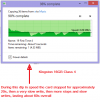Doc_d
New Member
I installed a Viofo Pro Duo in my truck and my Wife's Jeep recently. I bought two Samsung 256GB Evo Select SD cards. The camera in my truck has been working perfectly. The camera in my Wife's jeep has will randomly start beeping in odd patterns. Then it'll work for a while. I tried reformatting the card, resetting the camera, etc. It would work for a while then act up again. When I look at the files there are quite a few that don't contain the right amount of data / length of video. And there is a gap in time at the end of that short file and the start of the next file.
From reading here I decided to run h2testw on the SD card. I did not format it first because I wanted to test it in the same condition it was in since it was recently acting up. The test passed and also reported a good write speed. I forget the exact speed but let's just say it was 82.8 MB/s. But luckily I was watching it very closely while it was testing. I saw a number of times were a single write took very long, like 2 seconds. An error didn't occur, it just took much longer than it should have for a write. And if 99.9% of the blocks wrote at full speed the 0.1% wrote very slow it wouldn't impact the average write speed for the entire test very much. But it certainly cause a camera problems. I was luckily I happened to be watching a noticed it.
I wish h2testw would track how many blocks wrote under a certain threshold speed. I'm sure when the dashcam runs into one of those blocks that takes like 2 seconds to write, ultimately what happens in the RAM buffer holding the frames not written to the card yet gets over written. The camera detects the problem and probably beeps to indicate it, closes the current file and starts a new file.
Anyway I just wanted to share that just because h2testw reports a clean test doesn't mean that certain blocks did not take very long to write which will likely reek havoc with your dash cam. Are there any other utilities available that might detect both errors and the write speed dropping very low for certain blocks?
Doc
From reading here I decided to run h2testw on the SD card. I did not format it first because I wanted to test it in the same condition it was in since it was recently acting up. The test passed and also reported a good write speed. I forget the exact speed but let's just say it was 82.8 MB/s. But luckily I was watching it very closely while it was testing. I saw a number of times were a single write took very long, like 2 seconds. An error didn't occur, it just took much longer than it should have for a write. And if 99.9% of the blocks wrote at full speed the 0.1% wrote very slow it wouldn't impact the average write speed for the entire test very much. But it certainly cause a camera problems. I was luckily I happened to be watching a noticed it.
I wish h2testw would track how many blocks wrote under a certain threshold speed. I'm sure when the dashcam runs into one of those blocks that takes like 2 seconds to write, ultimately what happens in the RAM buffer holding the frames not written to the card yet gets over written. The camera detects the problem and probably beeps to indicate it, closes the current file and starts a new file.
Anyway I just wanted to share that just because h2testw reports a clean test doesn't mean that certain blocks did not take very long to write which will likely reek havoc with your dash cam. Are there any other utilities available that might detect both errors and the write speed dropping very low for certain blocks?
Doc
Last edited:

